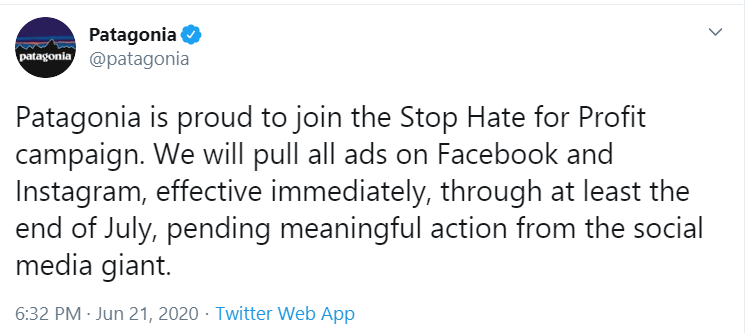Good Monday morning. It’s June 22nd. Watch Congress this week after dire warnings from the Fed and trade groups that small business recovery is still lagging. Here is Politico’s coverage of potential legislation that would allow businesses with a 50% revenue decrease to seek additional federal loan funds.
Today’s Spotlight is 1,588 words, about a 6 minute read.
1. News to Know Now
Events converge every few months to create multiple big digital marketing stories. Bear with us this week. There is a lot going on. You’re now reading a Spotlight edition that had three different lead stories this week.
a. Twitter labeled content that the president retweeted as “manipulated content” again last week. The president retweeted a faked video of two toddlers that were originally shown running to each other and hugging. The children’s parents are enraged that their children were depicted this way. The White House calls it “clever satire” and has not yet apologized for the doctored video that labels one child as “racist baby” and another as “terrified toddler.” (Mediate)
b. Facebook removed advertising for the president’s reelection campaign that used a symbol to describe the president’s opponents as what the Anti-Defamation League said “is practically identical to that used by the Nazi regime to classify political prisoners in concentration camps.” The campaign has argued that it should be allowed to use the symbol and spent more than one million dollars on those ads before Facebook pulled them. (CNN)
c. Spyware was hidden in more than 100 Google Chrome browser extensions, Reuters reported. The extensions were capable of creating screenshots and relaying passwords and files. I’ve gone through the list of extensions and found the overwhelming majority were used to create multiple simultaneous searches (for example, searching Bing and Google at the same time) or unofficial (non-Adobe) PDF viewers and editors.
Smartlinks: Reuters, Awake Security, ZDNet, Threat Post
d. Items “shipped from and sold by Amazon” may not adhere to the company’s own standards. A riveting expose at The Markup found Amazon prohibited items including pill presses used to counterfeit drugs, an AR-15 vise block masquerading as a paperweight, and kits used to extract and concentrate other drugs. How? Much of Amazon’s buying processes are automated. Markup’s reporters found nearly 100 listings for products that Amazon’s rules prohibit selling. (The Markup)
e. Amazon is also under internal fire after employees of its Chicago warehouses hung signs advising employees that they would be “honoring the Black community by supporting local Black businesses” with an “authentic” chicken and waffles lunch on Juneteenth, according to CNBC.
Not to be outdone, Snapchat released a photo filter on Friday that showed the subject in images of chains that could be broken by smiling. No, that is not a joke. Snapchat disabled the filter after a few hours on Friday and as of Sunday evening is still apologizing to people. You can read coverage at The Verge and also read the letter from (not making this up) Snapchat’s Vice President of Diversity. I’m guessing that her weekend was not very restful.
f. Facebook is facing backlash from civil rights groups and brand advertisers over the way in which hate speech and disinformation is moderated on the site. The groups, including the NAACP, ADL, and Color of Change, are leading a Facebook ad boycott called “Stop Hate for Profit.” Retailer REI and apparel maker The North Face were joined late Sunday by Patagonia, which issued the following announcement on Twitter.

2. COVID-19 Online Resources and News
Great Trackers
Johns Hopkins — the gold standard
Florida data — Unofficial, but the best I’ve seen for any state.
New York Times Vaccine Tracker — meticulously sourced
Info is Beautiful COVID datapack –> this data viz site gets it right
Tech News
Apple Watch, Fitbit May Help Spot Coronavirus Outbreaks – at Bloomberg
Fujitsu brings hand washing AI to COVID-19 fight — at Reuters UK
Global tide has turned against centralized contact tracing apps – at Quartz
N.Y. 3,000 Workers for Contact Tracing Off to a Slow Start – at NY Times
UK is abandoning contact tracing app for Google and Apple – at MIT Tech
Special Attention
Bloomberg’s acquisition of CityLab pays huge dividends with remarkable data like this set of interactive graphics that would be the top pick any week for our Great Data feature.
Pandemic Travel Patterns Hint at Our Urban Future – read at Bloomberg
3. Search Engine Optimization News
Google has launched its new text fragment link extension. The software allows people to create a direct link to a highlighted sentence or paragraph on a web page. The feature is useful, especially for groups, and has been around in third party apps for years.
If you’re using Chrome, here’s a link to a fragment on our website and here is a link to Ars Technica coverage.
This is important because Google continues to refine search results. The search engine regularly now goes right to the spot in a video that addresses a searcher’s query. This is a natural progression in that area.
Google may also be facing new search competition. We ordinarily don’t pay a lot of attention to new search companies because of the seemingly insurmountable advantage that Google and Bing have. A new search engine now accepting beta tester applications may change that. Neeva will be private and subscription-based. The concept sounds like a tough sell even for its two co-founders, the former Senior Vice President of Ads and Commerce at Google and the former Vice President of Monetization at YouTube.
Google also jumped into the intersection of search and social last week with a stealth startup called Keen that seems to fuse Pinterest and search with a dash of Instagram. Google is notorious for launching products simply to learn so don’t start investing a lot of time in the community there.
Here is Google’s video explanation of the service:
4. Also in the Spotlight — eBay Executives Did Crazy, Unbelievable Stuff
There is no good headline for this story. Wired gave up with “Allegedly Made Life Hell for Critics” but that’s not descriptive enough. Their subhead is “Surveillance. Harassment. A live cockroach delivery. US attorneys have charged six former eBay workers in association with an outrageous cyber stalking campaign.”
Except workers is a mild phrase for what the Massachusetts US Attorney’s office says involved the company’s Senior Director of Safety and Security and the Director of Global Resiliency. The former CEO and the former Chief Communications Officer are not charged with any crimes, but eBay has confirmed that they had knowledge of the harassment campaign.
It reads like half Beavis and Butthead & half Godfather.
5. Following Up: Zoom & Door Dash
We told you last week that Zoom was ready to release a new encryption upgrade for its video conference product, but would only make it available to paying customers. The company reversed its position and announced Wednesday that all customers would have access to the encryption. (MarketWatch)
We also told you about the acquisition of Grubhub, the third largest U.S. food delivery service. Industry leader Door Dash announced a $400 million funding round that values the company at $16 billion. That’s about the pre-COVID-19 size of Delta Air Lines, Quest Diagnostics or ConAgra Brands (Axios)
6. Debugging: The AP on Soros Conspiracy Theories
Lately I’ve seen a lot of conspiracy theories on social media and even in email regarding billionaire George Soros. He’s alternately been accused of releasing the novel coronavirus that causes COVID-19 and creating protests for racial justice.
It’s not just me. This weekend the Associated Press wrote, “Amplified by a growing number of people on the far right, including some Republican leaders, online posts about Soros have skyrocketed in recent weeks.”
Here’s their article debunking the disinformation.
7. ProTip: Recall Emails in Gmail
You know the feeling when you’ve hit send and have a startling realization that you shouldn’t have yet? Google’s Gmail allows you up to 30 seconds to recall that email, but you have to configure it from the default 5 seconds.
8. Great Data: My Favorite Data of All Time
The Pudding entertained me for days with their project about what music is remembered by people in different generations. It’s fascinating and to see the data, you get to go through 10 short clips yourself.
10. Coffee Break: Justice in June
This website was born of a list put together by two young women who wanted to help guide people who were asking them how they could be better allies for people of color.
You can select 10, 25 or 45 minute blocks to begin educating yourself on how to be an active ally of the black community. Each activity to read or watch is organized in a calendar with links.
I think is a great resource for everyone and urge you to have a look.
Justice in June




